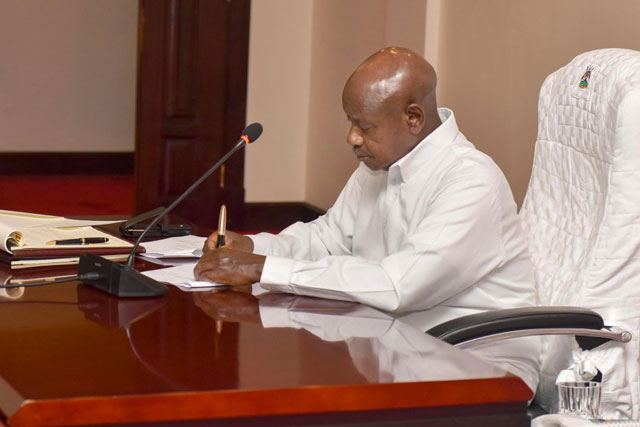
Kampala, Uganda | THE INDEPENDENT | President Yoweri Museveni has declined to assent to the Sexual Offences Bill, together with the Succession Amendment Bill passed by the Tenth Parliament earlier this year.
The Sexual Offences Bill which was presented before parliament by former Kumi Woman MP Monica Amoding provides for the criminalization of a range of sexual offences such as indecent utterances, gestures and touches to the sexual organs of another person. It stipulates that a person who performs a sexual act with another person without their consent is liable on conviction, to imprisonment for life.
The bill also creates an offence for a person who transmits, transfers, sends, forwards, directs material of a sexual nature to another without their consent. The framers of the law argued that whereas the Penal Code provides for a number of sexual offences, the provisions were outdated and did not reflect the evolving trends in social attitudes, values and sexual practices.
They argued that the courts find a challenge in dealing with new forms of sexual violence and exploitation such as sex tourism, indecent communication and child marriages among others. However, President Yoweri Museveni says that the draft has a collection of provisions that are already provided for in other legislation.
The Deputy Speaker Anita Among informed legislators this afternoon that the president has pointed out several offences regarding morality that are provided for under the Penal Code Act.
The President also noted that although the Uganda Law Reform Commission started a comprehensive review of all criminal related laws and their proposed amendments presented by the Minister of Justice and Constitutional Affairs to the Legal and Parliamentary Affairs Committee of Parliament, they were never considered.
Museveni says that instead of carrying out piecemeal amendments, the Uganda Law Reform Commission should be given an opportunity to review all the criminal laws and propose a comprehensive amendment of the relevant laws for parliament’s consideration.
In a separate letter, President Museveni also returned to parliament the Succession Amendment Bill requesting for its reconsideration. The bill sought to introduce a new agreement of sharing property where a spouse has died intestate.
He points out a clause that provides that, where an intestate is survived by the spouse and a dependant relative but no lineage dependants…the spouse shall receive 80 per cent and the dependent relative shall receive 20 per cent of the whole property of an intestate, and says that the provision is a complete departure from earlier provisions of the law while no clear justification.
The President proposes that the widow or widower receives 50 per cent of the estate, dependant relatives 49 per cent of the estate and customary heir 1 per cent of the estate.
Museveni also critiques a clause that seeks to provide that the surviving spouse of the intestate shall not take any interest in the estate of an intestate if the marriage between the surviving spouse or the intestate was suspended either by agreement or judicial officer. He proposed that this clause is deleted because it is ambiguous.
Museveni adds that where marriage is suspended by judicial order, the court would have to make a provision for sharing the property between the parties and that such an order would still suffice in the event of the death of one of the parties. He says that there is no need for parliament to provide for sharing of the property where a judicial order has already been issued.
But Felix Okot Ogong, the Dokolo South MP questioned whether parliament was proceeding well to reconsider the two Bills returned by the President yet the timeframe provided under the Constitution of 30 days has passed.
Among said that the Legal and Parliamentary Affairs commitee, which she has tasked to consider the President’s report will be in a position to advise the House on the way forward.
*****
URN
 The Independent Uganda: You get the Truth we Pay the Price
The Independent Uganda: You get the Truth we Pay the Price



